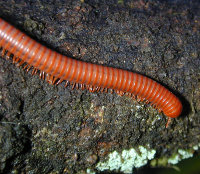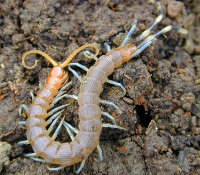За
The preposition за has multiple meanings and is used with several cases. One of those meanings is in sentences where someone goes somewhere to purchase something, where it is used with the instrumental case:
| Я зашёл в киоск за сигаретами. | I went to the kiosk for cigarettes. |
| Я пошёл в булочную за хлебом. | I went to the bakery for bread. |
The preposition doesn't necessarily imply purchasing.
| Алёна зайдёт к маме за книгой, которую она забыла на днях. | Alyona will drop by her mom's place for the book that she left there a few days ago. |
| Витя, забеги к соседу за гаечным ключом, который он у меня взял на прошлой неделe. | Vitali, run over to the neighbor's place for the wrench that he borrowed from me last week. |
| Я заехал в клинику за вакциной от сибирской язвы. | I dropped by the clinic for anthrax vaccine. |
It can also be used for picking someone up on the way somewhere:
| Я зайду за тобой в восемь часов, и мы вместе пойдём в кино. | I'll come by for you at eight o'clock, and we will go to the movies together. |
| Она заехалa за мной в семь часов, и мы поехали к её тёте на день рождения. | She came by to pick me up at seven o'clock, and we went to her aunt's place for [the aunt's] birthday party. |
Нужен
There are quite a few words in Russian that express the idea of needing something or needing to do something. One of the most common is a short form adjective: нужен, нужна, нужно, нужны. From the English point of view the construction associated with the word has a few quirks. First off, the word is a predicate adjective, which means it has to agree with it's subject. So if a book is needed, you say «Книга нужна». If milk is needed you say «Молоко нужно». The person who needs the item shows up in the dative case. Thus «Машина нужна Борису» “A car is necessary to Boris.” Despite the fact that the car is grammatically the subject of the sentence, in conversation it usually ends up at the end of the sentence, and the person usually ends up at the beginning. Thus the last example sentence usually comes out «Борису нужна машина». Here are some sample sentences:
| Мне нужны деньги. | I need money. |
| Ольге нужен плейер. | Olga needs a CD-player. |
| Борису нужна жена. | Boris needs a wife. |
| Нам нужно масло. | We need butter. |
To put the sentences in the past or future, you add forms of the verb “to be.” Since the thing you need is the subject, it determines the ending on the verb.
| Мне нужны овощи. | I need vegetables. |
| Мне нужны будут овощи. | I will need vegetables |
| Мне нужны были овощи. | I needed vegetables. |
Лимонад

An English speaker might assume that лимонад means lemonade, but in Russian it means almost any non-alcoholic beverage, usually carbonated, and usually sweetened with fruit or berry syrup or sometimes with various herbs or artificial flavors. In other words, it means soft drink. That's right: in Russian both Пепси-Кола and Кока-Кола are лимонад.
In Russia there are many лимонады that we Westerners usually don't encounter in the US. For instance:
| Name | Flavoring |
| Байкал | St. John's wort and licorice |
| Ситро | Various citrus flavorings |
| Бионад | Various flavors (even leechee) |
Probably the scariest one of them all is Тархун, pictured to the right, which is flavored with dragon's wort. Its green coloring makes it look like an industrial-sized bottle of Nyquil, and its flavor is somewhere between vile and repulsive.
Here are some sample sentences:
| — Какой ты хочешь лимонад? — Фанту. |
“What soft drink do you want?” “Fanta.” |
| Ой, у нас кончился лимонад. Придётся зайти в магазин. | Oh, no, we've run out of soft drinks. We'll have to run to the store. |
| Мама спрятала шоколадку в холодильнике за лимонадом. | Mom hid the chocolate bar in the refrigerator behind the soft drinks. |
| Хотя это плохо для здоровья, я не могу обходиться без лимонада. | Although it's bad for the health, I just can't do without soft drinks. |
Сороконожка
I have never had this conversation in Russian, but I can imagine having it:
| — Боря, как перевести на русский «centipede»? | “Boris, how do you translate ‘centipede’ into Russian?” |
| — «Сороконожка». | “‘Сороконожка.’” |
| — А «millipede»? | “And what about ‘millipede’?” |
| — Тоже «Сороконожка». | “That's also ‘Сороконожка.’” |
| — Правда? Как русские их отличают друга от друга? | “Really? How do Russians distinguish the one from the other?” |
| — Разве их нужно отличaть? | “Do you really need to tell them apart?” |
| — Ещё бы! «Centipedes» больно кусаются, а «millipedes» не кусаются вообще. | “And how! Centipedes have a painful bite, and millipedes don't bite at all.” |
Being from the crazy American West where little ol’ ladies own pistols and any self-respecting plant has thorns and a self-respecting river should be dry, I seem to have always known the words centipede and millipede. The difference is vital. A millipede you can drop down the back of your friend's blouse, and she'll squirm and shout and hate you for a week, but she won't go to the hospital. If you drop a centipede down the back of your friend's blouse, the centipede will bite like crazy, and she will want to go to the hospital and will hate you forever.
The stem сорок- means forty. The stem нож- means leg/foot, and the -ка suffix makes it a noun. Thus сороконожка literally means forty-footer. Cool, huh? Russians apply the word to any creepy-crawly that has a whole bunch of legs. There's a more bookish word that has the same meaning, which is многоножка, which means many-footer. We have a calque of that word in English, myriapod, but I've only heard entomologists use it. Certainly ordinary people in the US don't know that word. There is another word, сколопендра (borrowed from Latin scolopendra) which means centipede exclusively. Here are some sample sentences:
| Многоножки De Blainville — сапрофаги, питающиеся в почве растительными остатками (Russian Wikipedia) | The De Blainville millipedes are saprophagous, feeding on plant remains in the soil. |
| Известны случаи нападения гигантской сколопендры на птиц, ящериц и жаб. (Russian Wikipedia) | Giant centipedes have been known to attack birds, lizards and toads. |
| В Крыму есть популяции только самок сколопендр, они размножаются партеногенетически, без участия самцов. (source) | In the Crimea there are centipede populations that are exclusively female; they reproduce parthenogenetically, without the help of males. |
| Эта сороконожка не кусается. Она — твой друг. |
Эта сороконожка кусается. Она — не твой друг. |
 |
 |
| Photo courtesy of Wikipedia | Photo courtesy of Wikipedia |
Салат
If there is any word in the Russian language that a modern American is bound to misunderstand, that word is салат. For an American the primary meaning of salad is a mixture of raw leafy greens with a bit of dressing on top, perhaps with tomatoes or some other vegetables added. In Russia the leafy greens are not a requirement at all. If you mix a quantity of any vegetable matter with some kind of herbed sauce and serve it up on a plate, that is салат. For instаnce, a hundred grams of potatoes combined with enough mayonnaise to cover them, that is салат. If you combine a hundred grams of cucumber with enough sour cream to cover the slices and enough dill to make the sour cream green, that is салат.
Among the most well-known Russian salads are:
| Name | Ingredients |
| Салат «Оливье» | boiled potatoes hard-boiled eggs boiled sausage marinated cucumbers peas |
| Винегрет | boiled beets boiled potatoes boiled carrots sunflower oil |
| Мимоза | canned fish onions eggs mayonnaise |
| Салат из крабовых палочек | artifical crab hard-boilded eggs onion canned corn mayonnaise |
For a marvelous rant inspired by Мимоза, see Tanyant. For those of us who are vegetable-impaired, there is a valuable website called Мир салатов The World of Salads.
Салат can also mean lettuce, and thus it can also mean any salad made with lettuce as well. But what Russian ever uses lettuce?

Салат из крабовых палочек
Artificial crab salad
<< 1 ... 112 113 114 ...115 ...116 117 118 ...119 ...120 121 122 ... 158 >>